野性的呼唤英语读后感
- 格式:doc
- 大小:22.50 KB
- 文档页数:2
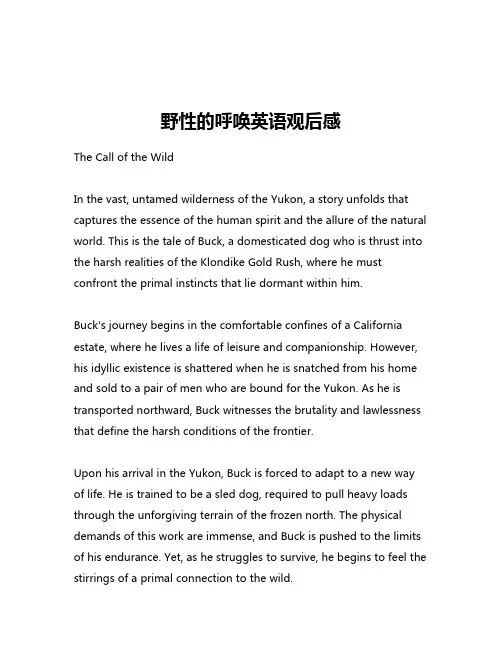
野性的呼唤英语观后感The Call of the WildIn the vast, untamed wilderness of the Yukon, a story unfolds that captures the essence of the human spirit and the allure of the natural world. This is the tale of Buck, a domesticated dog who is thrust into the harsh realities of the Klondike Gold Rush, where he must confront the primal instincts that lie dormant within him.Buck's journey begins in the comfortable confines of a California estate, where he lives a life of leisure and companionship. However, his idyllic existence is shattered when he is snatched from his home and sold to a pair of men who are bound for the Yukon. As he is transported northward, Buck witnesses the brutality and lawlessness that define the harsh conditions of the frontier.Upon his arrival in the Yukon, Buck is forced to adapt to a new way of life. He is trained to be a sled dog, required to pull heavy loads through the unforgiving terrain of the frozen north. The physical demands of this work are immense, and Buck is pushed to the limits of his endurance. Yet, as he struggles to survive, he begins to feel the stirrings of a primal connection to the wild.As Buck's journey continues, he encounters a series of masters, each of whom tests the boundaries of his loyalty and his growing sense of independence. From the cruel and abusive Spitz to the kind-hearted John Thornton, Buck navigates a complex web of relationships, learning to trust his instincts and to embrace the wild that calls to him.One of the most striking aspects of Buck's transformation is his growing connection to the wolf-like ancestors that lurk within his genetic makeup. As he ventures deeper into the wilderness, he begins to shed the trappings of domestication and to embrace the raw power and freedom of the natural world. This process is not without its challenges, as Buck must confront the fears and doubts that linger within him, but ultimately, it is this connection to his primal roots that allows him to thrive.Throughout his journey, Buck is confronted with the harsh realities of the Yukon, where survival is a constant battle and the line between civilization and savagery is blurred. He witnesses the cruelty and greed that drive many of the men who have come to the Yukon in search of wealth, and he is forced to grapple with the moral complexities of a world that is far removed from the comforts of his former life.Yet, even as he is tested by the harsh conditions of the Yukon, Buck finds solace in the beauty and power of the natural world. The vast, untamed landscapes of the north become a source of inspiration and strength, as he learns to navigate the treacherous terrain and to harness the primal energy that flows through him.Ultimately, Buck's journey is one of self-discovery and transformation. As he sheds the shackles of his domesticated past and embraces the wild that calls to him, he undergoes a profound change that challenges our notions of what it means to be human. Through his story, we are reminded of the enduring power of the natural world and the ways in which it can shape and transform the human spirit.In the end, the call of the wild proves to be irresistible for Buck, and he embarks on a final, fateful journey into the wilderness, leaving behind the trappings of civilization and embracing the freedom and power of the natural world. It is a poignant and powerful conclusion to a story that has captivated readers for generations, and a testament to the enduring allure of the wild and the transformative power of the human spirit.。
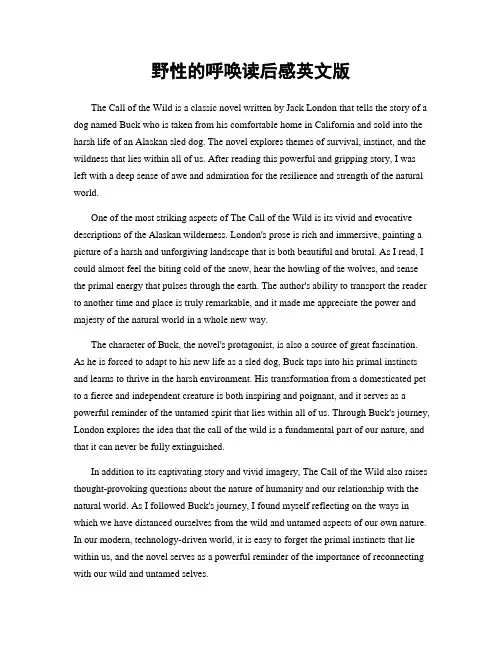
野性的呼唤读后感英文版The Call of the Wild is a classic novel written by Jack London that tells the story of a dog named Buck who is taken from his comfortable home in California and sold into the harsh life of an Alaskan sled dog. The novel explores themes of survival, instinct, and the wildness that lies within all of us. After reading this powerful and gripping story, I was left with a deep sense of awe and admiration for the resilience and strength of the natural world.One of the most striking aspects of The Call of the Wild is its vivid and evocative descriptions of the Alaskan wilderness. London's prose is rich and immersive, painting a picture of a harsh and unforgiving landscape that is both beautiful and brutal. As I read, I could almost feel the biting cold of the snow, hear the howling of the wolves, and sense the primal energy that pulses through the earth. The author's ability to transport the reader to another time and place is truly remarkable, and it made me appreciate the power and majesty of the natural world in a whole new way.The character of Buck, the novel's protagonist, is also a source of great fascination. As he is forced to adapt to his new life as a sled dog, Buck taps into his primal instincts and learns to thrive in the harsh environment. His transformation from a domesticated pet to a fierce and independent creature is both inspiring and poignant, and it serves as a powerful reminder of the untamed spirit that lies within all of us. Through Buck's journey, London explores the idea that the call of the wild is a fundamental part of our nature, and that it can never be fully extinguished.In addition to its captivating story and vivid imagery, The Call of the Wild also raises thought-provoking questions about the nature of humanity and our relationship with the natural world. As I followed Buck's journey, I found myself reflecting on the ways in which we have distanced ourselves from the wild and untamed aspects of our own nature. In our modern, technology-driven world, it is easy to forget the primal instincts that lie within us, and the novel serves as a powerful reminder of the importance of reconnecting with our wild and untamed selves.Overall, The Call of the Wild is a captivating and thought-provoking novel that left a deep impression on me. Its vivid descriptions, compelling characters, and thought-provoking themes combined to create a reading experience that was both thrilling and profound. After finishing the novel, I found myself contemplating the untamed spirit that lies within all of us, and the ways in which we can embrace and honor that wildness in our own lives. I highly recommend this novel to anyone who is interested in exploring the power and beauty of the natural world, and the wildness that resides within us all.。
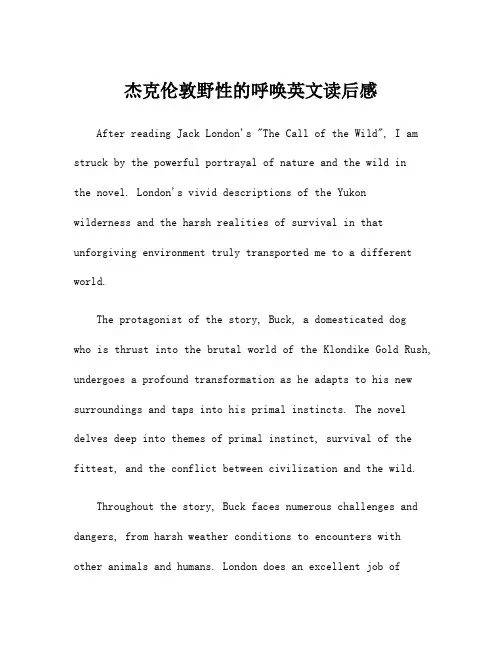
杰克伦敦野性的呼唤英文读后感After reading Jack London's "The Call of the Wild", I am struck by the powerful portrayal of nature and the wild inthe novel. London's vivid descriptions of the Yukonwilderness and the harsh realities of survival in that unforgiving environment truly transported me to a different world.The protagonist of the story, Buck, a domesticated dogwho is thrust into the brutal world of the Klondike Gold Rush, undergoes a profound transformation as he adapts to his new surroundings and taps into his primal instincts. The novel delves deep into themes of primal instinct, survival of the fittest, and the conflict between civilization and the wild.Throughout the story, Buck faces numerous challenges and dangers, from harsh weather conditions to encounters withother animals and humans. London does an excellent job ofhighlighting the raw and untamed beauty of the wilderness, as well as its unforgiving nature. As Buck learns to trust his instincts and embrace his wild side, he becomes a force to be reckoned with in the brutal world he inhabits.One of the most poignant moments in the novel for me was Buck's final realization that he belongs in the wild, running free and answering the call of his ancestors. This moment symbolizes the inevitability of nature and the fierce power that lies within all creatures. It also serves as a reminder of the primal instincts that still reside within us, even in the modern world.Overall, "The Call of the Wild" is a gripping andthought-provoking novel that explores the complexities of nature, civilization, and the human-animal bond. London's masterful storytelling and vivid imagery have left a lasting impact on me, and I highly recommend this book to anyoneinterested in adventure, nature, and the raw power of the wild.。
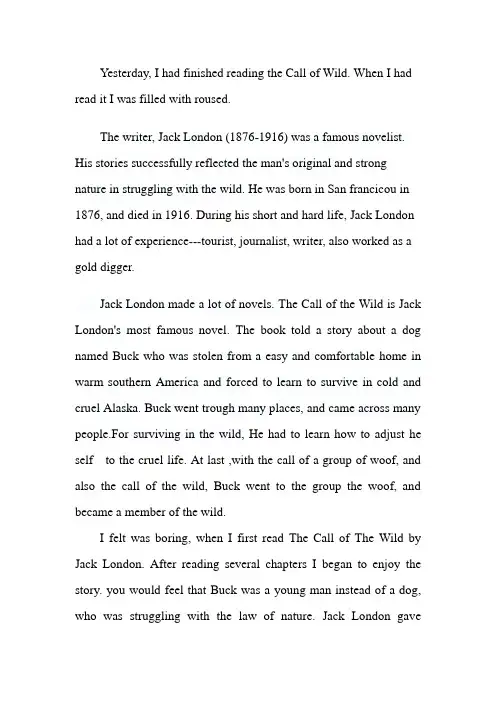
Yesterday, I had finished reading the Call of Wild. When I had read it I was filled with roused.The writer, Jack London (1876-1916) was a famous novelist. His stories successfully reflected the man's original and strong nature in struggling with the wild. He was born in San francicou in 1876, and died in 1916. During his short and hard life, Jack London had a lot of experience---tourist, journalist, writer, also worked as a gold digger.Jack London made a lot of novels. The Call of the Wild is Jack London's most famous novel. The book told a story about a dog named Buck who was stolen from a easy and comfortable home in warm southern America and forced to learn to survive in cold and cruel Alaska. Buck went trough many places, and came across many people.For surviving in the wild, He had to learn how to adjust he self to the cruel life. At last ,with the call of a group of woof, and also the call of the wild, Buck went to the group the woof, and became a member of the wild.I felt was boring, when I first read The Call of The Wild by Jack London. After reading several chapters I began to enjoy the story. you would feel that Buck was a young man instead of a dog, who was struggling with the law of nature. Jack London gavereaders a powerful messege to let people know that man should never be content in life because you were not able to foresee how the life was going on.Though short, it is really a thrilling story. What you never forget is the tough life in the nature, the brave and crafty dog. Maybe the wild is calling you to go ahead.。
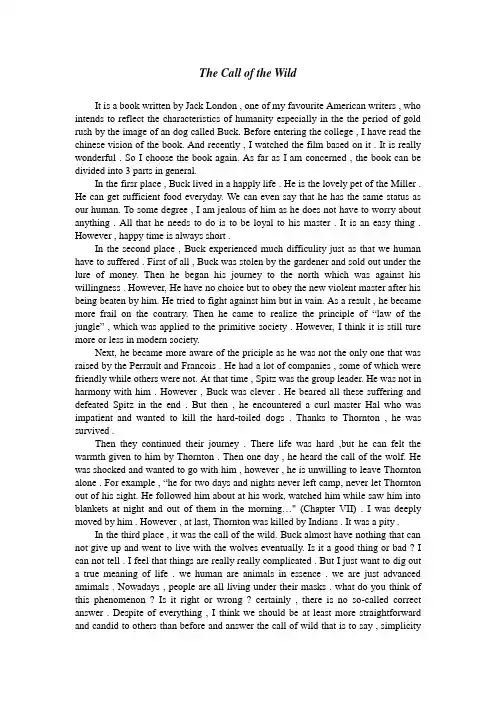
The Call of the Wild It is a book written by Jack London , one of my favourite American writers , who intends to reflect the characteristics of humanity especially in the the period of gold rush by the image of an dog called Buck. Before entering the college , I have read the chinese vision of the book. And recently , I watched the film based on it . It is really wonderful . So I choose the book again. As far as I am concerned , the book can be divided into 3 parts in general. In the firsr place , Buck lived in a happly life . He is the lovely pet of the Miller . He can get sufficient food everyday. We can even say that he has the same status as our human. To some degree , I am jealous of him as he does not have to worry about anything . All that he needs to do is to be loyal to his master . It is an easy thing . However , happy time is always short . In the second place , Buck experienced much difficulity just as that we human have to suffered . First of all , Buck was stolen by the gardener and sold out under the lure of money. Then he began his journey to the north which was against his willingness . However, He have no choice but to obey the new violent master after his being beaten by him. He tried to fight against him but in vain. As a result , he became more frail on the contrary. Then he came to realize the principle of “law of the jungle” , which was applied to the primitive society . However, I think it is still ture more or less in modern society. Next, he became more aware of the priciple as he was not the only one that was raised by the Perrault and Francois . He had a lot of companies , some of which were friendly while others were not. At that time , Spitz was the group leader. He was not in harmony with him . However , Buck was clever . He beared all these suffering and defeated Spitz in the end . But then , he encountered a curl master Hal who was impatient and wanted to kill the hard-toiled dogs . Thanks to Thornton , he was survived . Then they continued their journey . There life was hard ,but he can felt the warmth given to him by Thornton . Then one day , he heard the call of the wolf. He was shocked and wanted to go with him , however , he is unwilling to leave Thornton alone . For example , “he for two days and nights never left camp, never let Thornton out of his sight. He followed him about at his work, watched him while saw him into blankets at night and out of them in the morning…" (Chapter VII) . I was deeply moved by him . However , at last, Thornton was killed by Indians . It was a pity . In the third place , it was the call of the wild. Buck almost have nothing that can not give up and went to live with the wolves eventually. Is it a good thing or bad ? I can not tell . I feel that things are really really complicated . But I just want to dig out a true meaning of life . we human are animals in essence . we are just advanced amimals . Nowadays , people are all living under their masks . what do you think of this phenomenon ? Is it right or wrong ? certainly , there is no so-called correct answer . Despite of everything , I think we should be at least more straightforward and candid to others than before and answer the call of wild that is to say , simplicity and purity (in my opinion) . In all , I conceive that I may have some different or even opposite thoughts the next time when I read the book again . Anyway , I do love the brave , strong and sincere Buck .
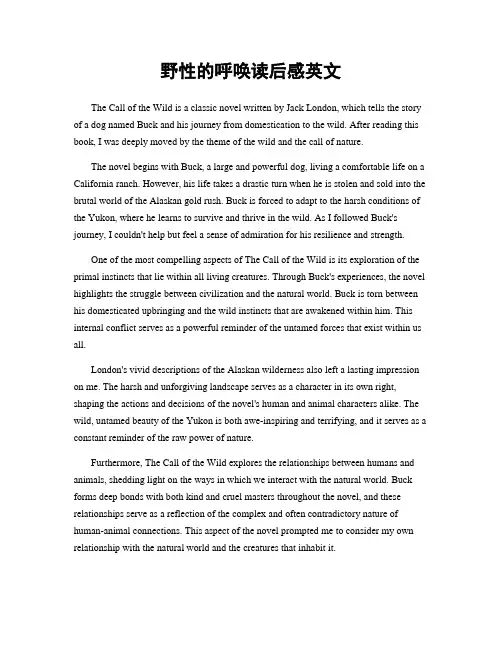
野性的呼唤读后感英文The Call of the Wild is a classic novel written by Jack London, which tells the story of a dog named Buck and his journey from domestication to the wild. After reading this book, I was deeply moved by the theme of the wild and the call of nature.The novel begins with Buck, a large and powerful dog, living a comfortable life on a California ranch. However, his life takes a drastic turn when he is stolen and sold into the brutal world of the Alaskan gold rush. Buck is forced to adapt to the harsh conditions of the Yukon, where he learns to survive and thrive in the wild. As I followed Buck's journey, I couldn't help but feel a sense of admiration for his resilience and strength.One of the most compelling aspects of The Call of the Wild is its exploration of the primal instincts that lie within all living creatures. Through Buck's experiences, the novel highlights the struggle between civilization and the natural world. Buck is torn between his domesticated upbringing and the wild instincts that are awakened within him. This internal conflict serves as a powerful reminder of the untamed forces that exist within us all.London's vivid descriptions of the Alaskan wilderness also left a lasting impression on me. The harsh and unforgiving landscape serves as a character in its own right, shaping the actions and decisions of the novel's human and animal characters alike. The wild, untamed beauty of the Yukon is both awe-inspiring and terrifying, and it serves as a constant reminder of the raw power of nature.Furthermore, The Call of the Wild explores the relationships between humans and animals, shedding light on the ways in which we interact with the natural world. Buck forms deep bonds with both kind and cruel masters throughout the novel, and these relationships serve as a reflection of the complex and often contradictory nature of human-animal connections. This aspect of the novel prompted me to consider my own relationship with the natural world and the creatures that inhabit it.In conclusion, The Call of the Wild is a thought-provoking and emotionally stirring novel that delves into the depths of the human and animal spirit. Jack London's masterful storytelling and powerful themes of nature and survival left a profound impact on me as a reader. This book serves as a timeless reminder of the primal forces that drive us and the enduring power of the wild.。
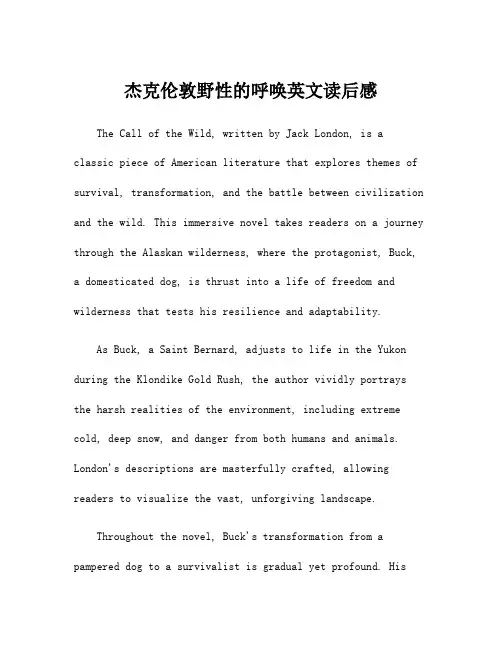
杰克伦敦野性的呼唤英文读后感The Call of the Wild, written by Jack London, is aclassic piece of American literature that explores themes of survival, transformation, and the battle between civilization and the wild. This immersive novel takes readers on a journey through the Alaskan wilderness, where the protagonist, Buck, a domesticated dog, is thrust into a life of freedom and wilderness that tests his resilience and adaptability.As Buck, a Saint Bernard, adjusts to life in the Yukon during the Klondike Gold Rush, the author vividly portrays the harsh realities of the environment, including extreme cold, deep snow, and danger from both humans and animals. London's descriptions are masterfully crafted, allowing readers to visualize the vast, unforgiving landscape.Throughout the novel, Buck's transformation from a pampered dog to a survivalist is gradual yet profound. Hisinitial recluse into downtime and his reliance on the domesticated life are a stark contrast to his eventual emergence as a dominant member of his pack, leading the other dogs with an unwavering spirit.One of the most striking aspects of The Call of the Wild is the symbolism London uses throughout the narrative. The wilderness itself becomes a representation of a primal strength within Buck that he must tap into to endure. The "call" he heeds is not just the biological instinctual pull, but also a metaphorical call to return to his fundamental essence.The novel delves into the complex relationship between man and nature. Buck's owner, John Thornton, represents the manly virtues of toughness and strength. His connection with Buck symbolizes human's attempt to harness and tame the wild, much like the gold miners trying to claim the riches beneath the snow-covered ground.As Buck faces adversity in the vast Alaskan wilderness, London explores the relationship between pain and strength. Buck's journey is not just about survival but also about the subjective experience of pain. The dogs experience excruciating pain from the cold, abuse, and relentless working conditions, yet they push through and become stronger as a result.The author's portrayal of the dog's behavior during slavery is particularly noteworthy. Buck's transition from a slave to a wild canine confidently leading another group is a powerful critique of human vanity and the authority it claiming over animals. It highlights the inherent rights of nature over humanity and the fleeting nature of human dominance.Another interesting element of the novel is the theme of death and its prevalence throughout the wilderness. The constant struggle against death is a fundamental component ofsurvival, and the hard-fought life of Buck and his companions is a testament to the unyielding force of life in the face of impending doom.Moreover, The Call of the Wild addresses the concept of a dog's pack and the leadership dynamics within it. Buck's leadership style and the ramifications of his actions on the pack showcase the intricate social structure of the canine world. Additionally, it reflects on human society's leadership structures and the struggle for power and authority.Furthermore, London subtly inverts the roles of the protagonist and antagonist. Although Buck is the primary character, it is the human Ellie, who provides a voice of compassion and empathy in a narrative dominated by the fervor and aggression of the Gold Rush era. The reader is witnessing the events from a dog's perspective, which provides a uniqueinsight into the gold miners' cruelty and the dogs' resilience.In conclusion, Jack London's The Call of the Wild is a profound narrative that delves into the essence of life and survival in the face of adversity. Through Buck's transformation, the reader is taken on a rollercoaster ride filled with danger, suffering, and hope. The novel serves as a reminder of the human tendency to neglect the primal forces still alive within us, urging us to acknowledge and respect the wildness that resides within us all. This timeless tale continues to captivate readers and provoke thought on the delicate balance between civilization and the wild.。
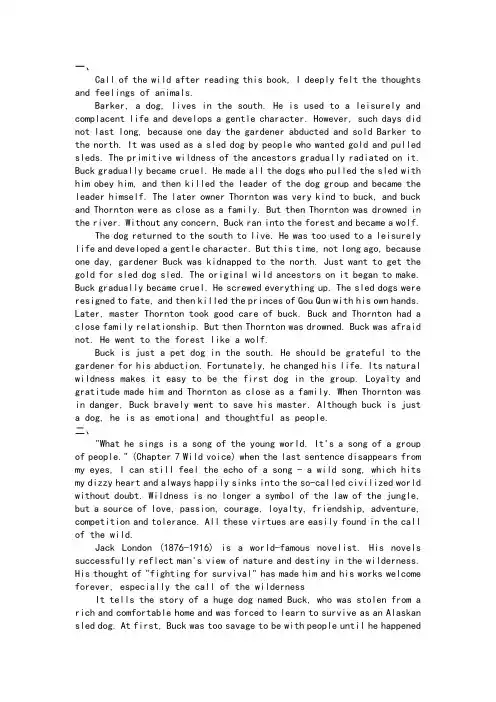
一、Call of the wild after reading this book, I deeply felt the thoughts and feelings of animals.Barker, a dog, lives in the south. He is used to a leisurely and complacent life and develops a gentle character. However, such days did not last long, because one day the gardener abducted and sold Barker to the north. It was used as a sled dog by people who wanted gold and pulled sleds. The primitive wildness of the ancestors gradually radiated on it. Buck gradually became cruel. He made all the dogs who pulled the sled with him obey him, and then killed the leader of the dog group and became the leader himself. The later owner Thornton was very kind to buck, and buck and Thornton were as close as a family. But then Thornton was drowned in the river. Without any concern, Buck ran into the forest and became a wolf.The dog returned to the south to live. He was too used to a leisurely life and developed a gentle character. But this time, not long ago, because one day, gardener Buck was kidnapped to the north. Just want to get the gold for sled dog sled. The original wild ancestors on it began to make. Buck gradually became cruel. He screwed everything up. The sled dogs were resigned to fate, and then killed the princes of Gou Qun with his own hands. Later, master Thornton took good care of buck. Buck and Thornton had a close family relationship. But then Thornton was drowned. Buck was afraid not. He went to the forest like a wolf.Buck is just a pet dog in the south. He should be grateful to the gardener for his abduction. Fortunately, he changed his life. Its natural wildness makes it easy to be the first dog in the group. Loyalty and gratitude made him and Thornton as close as a family. When Thornton was in danger, Buck bravely went to save his master. Although buck is just a dog, he is as emotional and thoughtful as people.二、"What he sings is a song of the young world. It's a song of a group of people." (Chapter 7 Wild voice) when the last sentence disappears from my eyes, I can still feel the echo of a song - a wild song, which hits my dizzy heart and always happily sinks into the so-called civilized world without doubt. Wildness is no longer a symbol of the law of the jungle, but a source of love, passion, courage, loyalty, friendship, adventure, competition and tolerance. All these virtues are easily found in the call of the wild.Jack London (1876-1916) is a world-famous novelist. His novels successfully reflect man's view of nature and destiny in the wilderness. His thought of "fighting for survival" has made him and his works welcome forever, especially the call of the wildernessIt tells the story of a huge dog named Buck, who was stolen from a rich and comfortable home and was forced to learn to survive as an Alaskan sled dog. At first, Buck was too savage to be with people until he happenedto meet his beloved master, kind-hearted John Thornton. Finally, John's accidental death broke Buck's last tie with the man and took him and his backpack into the wilderness he had long wanted. In this story, buck and John just take their own response to the call of wildlife. When buck thought that one day he would leave his master John, all he wanted to do was help him finish the gold rush. He "since then, day and night, never stop, in despair, he rushed into a long flight without leaving him (John)..." (Chapter 7 Wild voice) buck wants to remember John forever, He "never left the camp for two days and nights, never let Thornton out of his sight. He followed him at work, looked at him, wrapped him in a blanket at night and took him out of it in the morning... (Chapter 7) When I read these words, I couldn't help crying. Can a real man devote himself to loyalty and friendship in this way? On the other hand, John Thornton is not only a dog lover, but also a brave and adventurous man. His directness and simplicity make him an easy-going person. Once he has a goal firmly rooted in his heart, it seems that nothing can prevent him from achieving it except death. I don't know whether persistence is the most important factor in one's success, but what I know is that once you occupy success, you are not far from success.It was Jack London who brought me from a bustling and desperate city into a vibrant wilderness. There, I can't deny the attraction of Barker bark. It inspires me to pursue another half of human nature and explore the true meaning of life. Can we imagine that London intends to hire buck to set an example of a perfect person for us (not barbaric)? The answer is yes. As animals, although we come from the wild, there are more and more wild signs that we are "uncivilized". However, who can fully guarantee that we do not ignore some basic virtues? Especially now, we should stop paying attention to the post industrialized world and think about it. When deception, betrayal, lies, desire and crime are full of a materialistic society, whether London uses this novel to help itself escape from reality or to warn secular people is the same for us modern people. In modern society, many people are keen to talk about how to establish a "special relationship" with the authorities, cheat and lie to each other, which seems terrible.For them, life is a masked process, not a hard work. Every time you browse the web, scandals in politics, business, entertainment and even campus will come into your eyes. Oh, what is human nature? What is civilization to us? Do we need to review where we came from? Is it good or bad for us to say what we think and do what our conscience requires us to do? Are we wasting nature's gifts? Be an honest, straightforward, enthusiastic, emotional and responsible person, or a smart, cold and smart hypocrite? While embracing the garbage of "civilization", we are losing those beautiful virtues, which is the call of the wild. Once we lose them, we will lose ourselves and we will accomplish nothing. I hope this terribleidea is a complete fallacy, but now it makes me feel very cold.One day, I happened to stand on a majestic mountain top, overlooking a boundless grassland surrounded by sapphire sky and blown by rhythmic west wind. A round of dawn gracefully sprinkled her warmth and brilliance on me. However, at that moment, I'm afraid I can't appreciate these beauty. I'm a lost "civilized man".。
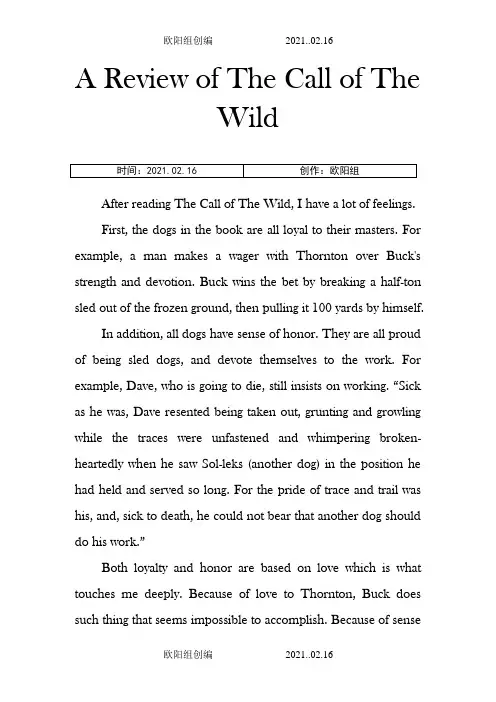
A Review of The Call of TheWildAfter reading The Call of The Wild, I have a lot of feelings.First, the dogs in the book are all loyal to their masters. For example, a man makes a wager with Thornton over Buck's strength and devotion. Buck wins the bet by breaking a half-ton sled out of the frozen ground, then pulling it 100 yards by himself.In addition, all dogs have sense of honor. They are all proud of being sled dogs, and devote themselves to the work. For example, Dave, who i s going to die, still insists on working. “Sick as he was, Dave resented being taken out, grunting and growling while the traces were unfastened and whimpering broken-heartedly when he saw Sol-leks (another dog) in the position he had held and served so long. For the pride of trace and trail was his, and, sick to death, he could not bear that another dog should do his work.”Both loyalty and honor are based on love which is what touches me deeply. Because of love to Thornton, Buck does such thing that seems impossible to accomplish. Because of senseof honor, Dave insists on working till he dies.And through Buck’s experiences living in the wild, Jack London wants to tell us that the world is dominated by those who are much stronger and more powerful than common people, and only the stronger ones could exist. This is the law of club and fang. Buck gradually realizes the law and begins to obey the law after he is stolen and taken to the wild. The savage environment which is full of tricks, dangers and deaths turns him to be more powerful and cunning. Finally, he becomes the leader of his team. Similar to the wild, our society becomes crueler and crueler, and living in the society becomes harder and harder. If you want to exist, to have a good life, you should be tough enough to stand the sufferings; you should keep alert, watch and learn; you should make yourself stronger than others. This is the law of living.As we know, Buck answers the call of and returns to the wild finally. In my opinion, the call is not from the wild though Buck often hears the howl of the wolves. Instead, it is from the bottom of Buck’s heart. The call is the will or the instinct which makes him want to be himself: A wolf.I think every one of us has a call in our hearts. The call is our dream, goal or something we really want to do. However, under the pressure of society, we often have to give up ourdreams or goals, and do things we are unwilling to do. So we should learn something from Buck: Just follow the call, and be yourself!。
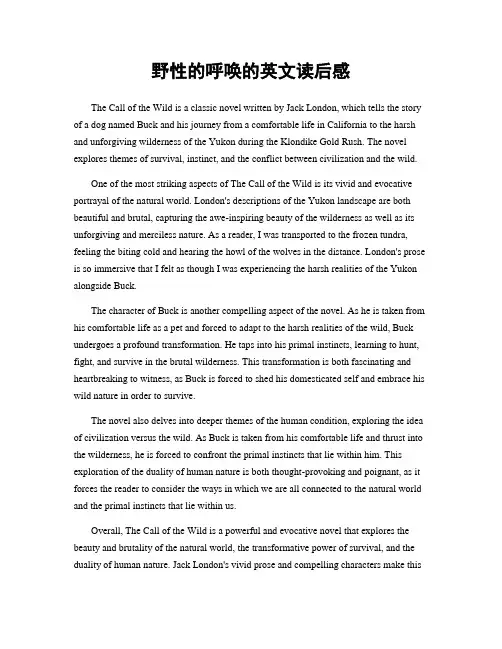
野性的呼唤的英文读后感The Call of the Wild is a classic novel written by Jack London, which tells the story of a dog named Buck and his journey from a comfortable life in California to the harsh and unforgiving wilderness of the Yukon during the Klondike Gold Rush. The novel explores themes of survival, instinct, and the conflict between civilization and the wild.One of the most striking aspects of The Call of the Wild is its vivid and evocative portrayal of the natural world. London's descriptions of the Yukon landscape are both beautiful and brutal, capturing the awe-inspiring beauty of the wilderness as well as its unforgiving and merciless nature. As a reader, I was transported to the frozen tundra, feeling the biting cold and hearing the howl of the wolves in the distance. London's prose is so immersive that I felt as though I was experiencing the harsh realities of the Yukon alongside Buck.The character of Buck is another compelling aspect of the novel. As he is taken from his comfortable life as a pet and forced to adapt to the harsh realities of the wild, Buck undergoes a profound transformation. He taps into his primal instincts, learning to hunt, fight, and survive in the brutal wilderness. This transformation is both fascinating and heartbreaking to witness, as Buck is forced to shed his domesticated self and embrace his wild nature in order to survive.The novel also delves into deeper themes of the human condition, exploring the idea of civilization versus the wild. As Buck is taken from his comfortable life and thrust into the wilderness, he is forced to confront the primal instincts that lie within him. This exploration of the duality of human nature is both thought-provoking and poignant, as it forces the reader to consider the ways in which we are all connected to the natural world and the primal instincts that lie within us.Overall, The Call of the Wild is a powerful and evocative novel that explores the beauty and brutality of the natural world, the transformative power of survival, and the duality of human nature. Jack London's vivid prose and compelling characters make thisa timeless and thought-provoking read that will stay with me long after I have turned the final page.。
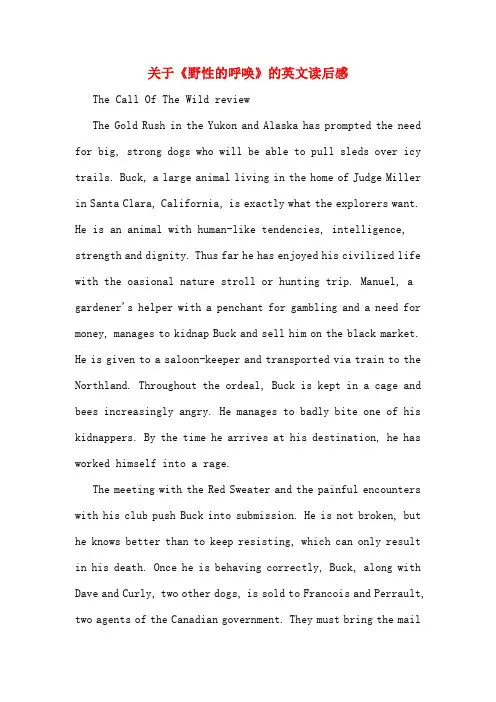
关于《野性的呼唤》的英文读后感The Call Of The Wild reviewThe Gold Rush in the Yukon and Alaska has prompted the need for big, strong dogs who will be able to pull sleds over icy trails. Buck, a large animal living in the home of Judge Miller in Santa Clara, California, is exactly what the explorers want. He is an animal with human-like tendencies, intelligence, strength and dignity. Thus far he has enjoyed his civilized life with the oasional nature stroll or hunting trip. Manuel, a gardener's helper with a penchant for gambling and a need for money, manages to kidnap Buck and sell him on the black market. He is given to a saloon-keeper and transported via train to the Northland. Throughout the ordeal, Buck is kept in a cage and bees increasingly angry. He manages to badly bite one of his kidnappers. By the time he arrives at his destination, he has worked himself into a rage.The meeting with the Red Sweater and the painful encounters with his club push Buck into submission. He is not broken, but he knows better than to keep resisting, which can only result in his death. Once he is behaving correctly, Buck, along with Dave and Curly, two other dogs, is sold to Francois and Perrault, two agents of the Canadian government. They must bring the mailbetween Skaquay and Dawson, Alaska. While in camp, Curly is killed for trying to make friendly advances to another husky. Buck understands that this is the law of club and fang which dominates this new world. He resolves never to go down in that manner.Buck and Dave join a preexisting dog team led by Spitz, a bullying husky dog. The trail work begins immediately. Buck learns fast from the other dogs. In time he starts to bee more wild, losing the domesticity imposed upon him in the Judge's home. Tensions develop between him and Spitz. Buck is ready to be a leader, and looks to usurp Spitz's power. While hunting a rabbit one night, the two end up in a fight to the death. Buck achieves mastery. When Francois attempts to place Sol-lek at the head of the team, Buck refuses to allow it. Even the appearance of a club does not faze him, for he has learned how to avoid it. When Francois allows him to take the position, he is amazed by Buck's abilities. Buck begins to dream of an ancient world in which man and dog fought side by side to survive.After two round trips between towns, the dogs are exhausted and overworked. Francois and Perrault are very proud of their team, having just set a record for their run. But they receivenew orders and must bid the dogs goodby. Several Scottish "half-breeds" take charge of Buck and his other dogs. He does not have strong feelings for them, but they are good men and they care for the dogs. Buck's dreams of the ancient world grow more vivid. The path is very difficult and men and dogs alike are growing weak. One day Dave shows so much pain that one of the men tries to get him to run behind the sled. He refuses so adamantly that the men give in and allow him to run himself out. The next morning they drive the sled away, then one man returns and shoots Dave.After this last trip, the Scottish men are told to sell the dogs and buy fresher ones. The team is sold to a group of tenderfoots -- Hal, Charles, and Mercedes -- looking to strike it rich. Theyhave no idea how to work with a dog team. In Hal's eagerness to plete the trail, he terribly mistreats the dogs. His quiet brother-in-law Charles and weepy sister Mercedes only increase the difficulty. Hal's inpetent handling of the rations leads them to run out of food for the dogs half-way through the trip. Starving and overworked, one by one the dogs start to die. The remnants pull into the camp of John Thornton. Buck refuses to rise when Hal wants to leave. After watching the cruel youngman beat Buck repeatedly, John steps in and saves him by cutting him out of the harness. The rest of the team continues. Only a quarter-away, the sled falls through the ice, thinned by the sun, and dogs and humans perish together.Buck falls wildly in love with John Thornton, who immediately recognizes that Buck is one of a kind. Under John's influence, forted by his two other dogs Skeet and Nig, Buck begins to heal. He aomplishes a number of miraculous things for John, saving his life twice and winning a bet that allows him to pay off all his debts. He does not forget his visions of the primitive world, but he is happy at John's side. Along with Hans and Pete, John's partners, the dogs go on an expedition for a lost mine. The work on the trail, the daily hunting, are absolutely delightful for Buck. Though they don't find the mind, they do find gold, and so there is no more work for the dogs to do. Buck ruminates once more on the call that he hears nightly in the forest.Eventually he starts to sleep away from the camp. He embraces his instincts and wild tendencies, killing his own food and watching out for himself. Buck meets a wolf who befriends him and is quite sad when he returns to the camp. This pattern continues, until one day Buck returns to the camp to findeveryone killed by the Yeehats, a Native American tribe. He flies into a rage at the death of beloved John, and kills all the men who do not run away from him. There is no more tie to mankind, so Buck returns to the forest and remains with a pack of wolves. Each year he visits to the valley where John Thornton died, mourning his lost, dearest friend.The self-awakening of a dog——reading The Call Of The WildBefore being trafficked by a deceitful gardener to the extremely cold Northland, Buck had everything that was provided by his cultured and wealthy owner. He was more a pet than an independent creature. To some extend, his unfortunate experience benefits him a lot because it shows what the real face of nature looks like and where his place should be. Situations are just the same when it es to the teenagers nowadays.Living under other people's will instead of their own , teenagers feel something missing from heart at times and they either turn to virtual world ,dreaming away their time, or they are driven by the eagerness for profit and fame, always in a rush. To fill the emptiness, what we actually need is a desire for life. But If we haven't struggled against unfair fate asBuck did, how will we value what we possess at present? If we don't get in close contact with nature as our ancestors did, how can we understand the deep meaning conveyed by those classical literary works? That is where teenager's trouble lies .And Buck showed us a great method.After a seemingly tough struggle, Buck managed to survive the bloody fight against wolves and return to embrace nature with plete freedom he won from the war. With his sense sharpened, Buck experienced more, and learned something else about nature’s way.As a matter of fact, for animals, it's quite easy to make the change. For us human beings, although we are far more intelligent than any dog , it is also far more difficult for us to achieve self awakening as a consequence of internal and external obstacles. Now that we can not break away from society, absolute freedom keeps a distant dream. Now we are far from nature and have only limited freedom both physically and mentally. For one thing, we are losing wild nature. Unlike Buck, we are no longer able to run and jump as we wish .Both our senses and skills are declining, which holds us from scrabbling for the amazing beauty of nature. For another, we are abusing violence as well as suffering from it at the same time. We forcepeople to aept our own conceptions unconsciously even though they are unwilling to. We set every potential enemy up whole day and all night while in nature, even wolf and deer live in peace most of the time.But one thing is for sure .That is, whichever means we take, we will eventually find out what our natural state of mind is and have a good balance between humanity and wild nature. Then, we will be guaranteed much bigger happiness than Buck was. The call of the wildIt tells a story about a gigantic dog who was called Buck. It was stolen from a rich and fortable home by the man who was in debt. Then buck was forced to learn to survive as an Alaskan sled dog(阿拉斯加雪橇犬).Buck encountered his true owner John Thornton who is very friendly and kindhearted after a long terrify life. Finally, John’s incidental death break Buck’s last tie to the man and drives him into the call of the wild. In this story, Buck and John simply adopt themselves to answer the call of the wild. Buck will eventually leave John one day even if the incidental death does not happen to John. Buck just wanted to help his master finish the gold-rush-trip when the wild es to his mild.‘From then on, night and day, never put a halt, in desperation, he burst into long stretch of fight, did not to stay him (John)’. Buck wished to remember John’ image forever.I could not hold my tears bursting. Can a real man devote himself to loyalty and friendship in such a way? On the other hand, John Thornton is not only a dog-lover but also a brave and venturous man. He is so straightforward and simple that makes him an aommodating man. Once he firmly roots a goal into his heart, it seems that nothing could prevent him from aomplishing it except death. I do not know whether the persistence is the most vital element to make a man suessful, but what I know is that you are not far away from suess once you oupy it.It is Jack London who let us into the animated wild from the hustle-and-bustle and from desperate city. There, I merely cannot deny the attraction of Buck’s bark, which enlightens me to pursue another lost half of the nature in mankind, and to dig out a true meaning of life. What is the essence of human beings? What is the civilization to us? Do we need to look back at where we came from? Is it good or bad for us to speak out what we think and to do what the consciences demand us to? It is thought-provoking.内容仅供参考。
野性的呼唤读后感英文The Call of the Wild is a classic novel written by American author Jack London. The book is set in the Klondike Gold Rush of the 1890s and tells the story of a domesticated dog named Buck who is stolen from his home in California and sold into the brutal life of an Alaskan sled dog. The novel is a powerful tale of survival, instinct, and the wildness that lies within all of us. After reading this book, I felt profoundly moved and inspired by the way that London was able to capture the essence of the wild and remind us of the primal aspects of our own existence.For me, one of the most poignant moments in the book is when Buck has his first taste of freedom after escaping from his captors. He is able to run and hunt and play in the wilderness, and for the first time, he feels truly alive. This moment symbolizes the way that we are all creatures of the earth, and how we need to connect with nature to be truly happy and fulfilled. When we are disconnected from the natural world, we lose touch with our own instincts and desires, and we become unhappy and restless. Another moment that stands out to me in The Call of the Wild is when Buck is forced to fight other dogs in order to establish his dominance as the leader of the pack. This scene highlights the innate struggle for survival and power that exists within all living creatures. It also shows how violence is sometimes necessary in order to achieve our goals and protect ourselves and our loved ones. This scene reminds us that even though we may like to think of ourselves as civilized and refined, we still have the capacity for violence and aggression when pushed to our limits.In conclusion, The Call of the Wild is a powerful and thought-provoking novel that speaks to the deepest aspects of our nature as human beings. It reminds us of the importance of connecting with the natural world and tapping into our primal instincts in order to live our best lives. Whether we are struggling to survive in the frozen tundra of Alaska or navigating the complexities of modern society, we all have a wildness within us that needs to be acknowledged and embraced. This book is a testament to the power of nature and the resilience of the human spirit, and I would highly recommend it to anyone looking for a powerful and inspiring read.。
野性的呼唤观后感100字左右英语全文共10篇示例,供读者参考篇1The call of the wild is such a cool movie! I just watched it and I loved every minute of it. The story is all about this dog named Buck who gets taken away from his home and has to learn how to survive in the wild. It's so exciting and there's lots of action and adventure.I really liked how Buck was so brave and strong. Even when things were tough, he never gave up. He made friends with other animals and even became the leader of the pack. It was amazing to see him grow and change throughout the movie.The movie also taught me a lot about nature and animals. I learned how important it is to respect the wild and all the creatures that live there. It made me want to go outside more and explore the world around me.One of my favorite parts was when Buck found his true calling and embraced his wild side. It was like he finally found where he belonged and was truly happy. It made me feel inspired to follow my own dreams and passions.Overall, I think "The Call of the Wild" is an awesome movie that teaches us important lessons about bravery, friendship, and the power of nature. I would definitely recommend it to all my friends and classmates. It's a must-watch for anyone who loves animals and adventure!篇2"Wilderness Calling" is an amazing movie that I watched recently. It's all about adventure, friendship, and courage. The story is set in the beautiful wilderness, where the main character, Jack, goes on a thrilling journey to find his missing father.I really liked how the movie showed the importance of teamwork and never giving up. Jack faced many challenges along the way, but with the help of his friends, he was able to overcome them. It taught me that no matter how tough things get, we should always support each other and keep pushing forward.The friendship between Jack and his friends was also very heartwarming. They stuck together through thick and thin, and never left anyone behind. It made me realize the value of true friendship and how it can make even the most difficult situations bearable.The movie also inspired me to be brave and face my fears. Jack had to confront many dangers during his journey, but he never backed down. It showed me that we should always be courageous and never let fear hold us back from achieving our goals.Overall, "Wilderness Calling" was a thrilling and heartwarming movie that taught me important lessons about friendship, courage, and perseverance. I would highly recommend it to anyone looking for a great adventure film with a powerful message.篇3The Call of the Wild is a really cool movie that I just watched. It's all about this big dog named Buck who goes on an adventure in the wild and meets some really interesting characters along the way.I really liked how Buck never gave up, even when things got tough. He was always so brave and determined to survive in the wild. It made me realize how important it is to never give up, no matter how hard things may seem.The movie also made me think about the importance of friendship. Buck meets a lot of different animals on his journey,and even though they are all different, they all end up becoming friends in the end. It showed me that you can find friends in the most unexpected places, and that it's important to cherish those friendships.But the most important lesson I learned from The Call of the Wild is that it's okay to be yourself. Buck goes through a lot of changes throughout the movie, but he always stays true to who he is. He never tries to be someone he's not, and he is rewarded for it in the end.Overall, I really enjoyed watching The Call of the Wild. It taught me a lot of important lessons about bravery, friendship, and staying true to yourself. I would definitely recommend this movie to all my friends because it's not only entertaining, but it also has some really great messages that everyone can learn from.篇4I recently watched the movie "Wild and Call of the Wild" and it was super cool! The movie is all about a dog named Buck who goes on an adventure in the wild. It was so exciting to see all the different animals and places that Buck visited.One thing that really stood out to me was how important it is to be kind to animals. Buck was treated really badly at first, but then he found some nice people who took care of him. It made me think about how we should always be nice to animals and treat them with love and respect.I also learned a lot about friendship from watching the movie. Buck made friends with all kinds of different animals, like wolves and birds. It showed me that friends can come in all shapes and sizes, and that it's important to be open to meeting new people and animals.The movie was also really funny at times, especially when Buck was trying to figure out how to survive in the wild. It made me laugh a lot and I had a great time watching it.Overall, I really enjoyed watching "Wild and Call of the Wild" and I would definitely recommend it to all my friends. It was a fun and exciting movie that taught me a lot about kindness, friendship, and the importance of adventure.篇5"The Call of the Wild" is a very interesting movie that I watched recently. It is about a dog named Buck who lives happily with his family until he is kidnapped and sold into the harsh lifeof a sled dog. Throughout the movie, I learned a lot about survival, loyalty, and the bond between humans and animals.One thing that really stood out to me in the movie was how Buck's wild instincts helped him survive in the tough wilderness. He had to learn to fight for his food, protect himself from dangerous predators, and navigate through the unforgiving terrain. It made me realize the importance of being resourceful and adapting to new situations, just like Buck did.Another important theme in the movie is loyalty. Even though Buck was taken away from his family and placed in a harsh environment, he never forgot where he came from. He formed strong bonds with his fellow sled dogs and remained loyal to his new master, John Thornton. This showed me the power of friendship and loyalty, even in the most challenging circumstances.Lastly, the movie also highlighted the strong connection between humans and animals. John Thornton saved Buck from a cruel owner and treated him with love and respect. Their bond was so strong that Buck would do anything to protect John, even risking his own life. It made me realize the importance of treating animals with kindness and compassion, as they are capable of forming deep emotional connections with humans.Overall, "The Call of the Wild" was a touching and inspiring movie that taught me valuable lessons about survival, loyalty, and the bond between humans and animals. It made me appreciate the beauty of nature and the resilience of the animal kingdom. I highly recommend watching this movie to anyone who loves adventure and heartwarming stories.篇6The Call of the Wild is a very exciting and interesting movie. It tells the story of a dog named Buck who goes on an adventure in the wild. Buck is a very brave and strong dog who faces many challenges and dangers in the wild.I really enjoyed watching this movie because it made me feel like I was part of the adventure. The scenery in the movie was so beautiful, especially the snow-covered mountains and forests. It made me want to go on a similar adventure myself.One of the things I liked most about the movie was Buck's character development. At the beginning, he is just a spoiled pet, but as he faces challenges and learns how to survive in the wild, he becomes a strong and independent dog. It was inspiring to see how Buck never gave up, even when things were tough.The relationship between Buck and his owner, John Thornton, was also very touching. John cared for Buck and treated him like a member of the family. It made me realize how important it is to treat animals with love and respect.Overall, The Call of the Wild is a great movie that teaches us about the power of courage, friendship, and the beauty of nature. It is a movie that will make you laugh, cry, and feel inspired. I highly recommend watching it!篇7Today I watched a movie called "The Call of the Wild" and it was so cool! It was all about a dog named Buck who goes on a big adventure in the wild. I learned so much from watching this movie and I want to share my thoughts with you.First of all, I loved how brave and strong Buck was. He had to go through so many tough challenges in the wild, like fighting other dogs and dealing with mean people. But no matter what, he never gave up. That taught me that it's important to always be brave and never give up, even when things get tough.I also liked how Buck made friends with other animals in the wild, like the wolf and the bear. It showed me that even if we are different from each other, we can still become friends and helpeach other out. It made me think about how important it is to be kind and caring towards others, no matter who they are.Another thing I learned from the movie is that nature is so beautiful and we should always respect it. Buck loved running through the forest and playing in the snow, and it made me appreciate all the amazing things that nature has to offer. It reminded me to always take care of the environment and the animals that live in it.Overall, "The Call of the Wild" was a great movie that taught me so many important lessons. It made me think about being brave, making friends, and respecting nature. I hope that I can be more like Buck and make a positive impact on the world around me.篇8"Wow, 'The Call of the Wild' is such an amazing movie! I just watched it and I can't stop thinking about it. It's all about this dog named Buck who goes on this crazy adventure in the wild. The story is so exciting and it really kept me on the edge of my seat.One thing that really stood out to me was how Buck had to rely on his instincts to survive in the wild. It made me think abouthow important it is to trust yourself and listen to your gut feelings. Buck was so brave and determined, even when things got tough. It really inspired me to be more confident and resilient in my own life.The movie also made me think about the bond between animals and humans. Buck had such a strong connection with his owner, John Thornton, and it was heartwarming to see how much they cared for each other. It made me realize the importance of loyalty and friendship, whether it's with pets or people.Overall, 'The Call of the Wild' made me feel so many emotions – excitement, sadness, and joy. It's a story that really makes you think about what it means to be truly free and alive. I would definitely recommend it to all my friends, because it's a movie that will stay with you long after the credits roll."篇9Oh my goodness, "The Call of the Wild" is such an amazing movie! I watched it recently and I totally loved it. The story is about a dog named Buck who goes on a wild adventure in the wilderness of Alaska. It's so exciting and there are so many cool animals in the movie.Buck is such a brave and strong dog, he has to fight other dogs and even wolves to survive in the wild. But he also makes friends with other animals like a kind wolf named White Fang. I think Buck is a really cool character because he never gives up even when things get tough.The movie also has a really important message about the power of nature and how we need to respect it. The wild is so beautiful and powerful, but it can also be dangerous if we don't take care of it. I think it's a reminder that we need to protect our environment and all the animals that live in it.I also learned a lot about teamwork and friendship from the movie. Buck and his friends all work together to overcome challenges and help each other. It made me think about how important it is to be there for your friends and support them no matter what.Overall, "The Call of the Wild" is an awesome movie that has action, adventure, and heartwarming moments. I really enjoyed watching it and I can't wait to see it again. I definitely recommend it to all my friends!篇10Today, I watched the movie "The Call of the Wild" with my friends. It was such an amazing movie! The story is about a dog named Buck who goes on an adventure in the wild with his friend John Thornton. I learned so many things from this movie and it made me think a lot.One thing I learned is the importance of friendship. Buck and John Thornton become best friends and they help each other through tough times. It made me realize how lucky I am to have friends who care about me. Friends can always support you and make you feel happy.Another thing I learned is the power of nature. The movie shows how beautiful and dangerous nature can be. It made me want to explore the world and see all the amazing things that nature has to offer. I want to go on adventures and experience new things, just like Buck did in the movie.The movie also taught me about bravery and courage. Buck faces many challenges in the wild but he never gives up. He is brave and strong, just like a superhero. It made me think about how I can be more brave in my everyday life and face my fears head on.Overall, "The Call of the Wild" is a movie that teaches us valuable lessons about friendship, nature, and bravery. I highlyrecommend it to everyone, especially kids like me. It's a movie that will make you laugh, cry, and think about the world around you. I can't wait to watch it again with my friends!。
The Call of The Wild I About Jack London Jack London(born Jan. 12, 1876, died Nov. 22, 1916), whose life symbolized the power of will, was the most successful writer in America in the early 20th Century. His vigorous stories of men and animals against the environment, and survival against hardships were drawn mainly from his own experience. An illegitimate child, London passed his childhood in poverty in the Oakland slums. At the age of 17, he ventured to sea on a sealing ship. The turning point of his life was a thirty-day imprisonment that was so degrading it made him decide to turn to education and pursue a career in writing. And his experiences of searching for gold in the Klondike left their mark in his stories. His work embraced the concepts of unconfined individualism and Darwinism in its exploration of the laws of nature.
II Plot Buck is a dog who leads a comfortable life in a California ranch home with his owner, a judge, until he is stolen and sold to pay off a gambling debt. Buck is taken to Alaska and sold to a pair of French Canadians who were impressed with his physique. They train him as a sled dog, and he quickly learns how to survive the cold winter nights and the pack society by observing his teammates. Buck is later sold again and passes hands several times, all the while improving his abilities as a sled dog and pack leader.
Eventually, Buck is sold to a man, his wife, and her brother who know nothing about sledding nor surviving in the Alaskan wilderness. They struggle to control the sled and ignore warnings not to travel during the spring melt. As they journey on, they run into John Thornton, an experienced outdoors man, who notices that all of the sled dogs are in terrible shape from the ill treatment of their handlers. Thornton warns the trio against crossing the river, but they refuse to listen and order Buck to mush. Exhausted, starving, and sensing the danger ahead, Buck refuses. Recognizing him as a remarkable dog and disgusted by the driver's beating of the dog, Thornton cuts him free from his traces and tells the trio he's keeping him. After some argument, the trio leaves and tries to cross the river, but as Thornton warned the ice gives way and they drown.
As Thornton nurses Buck back to health, Buck comes to love him and grows devoted to him. Thornton takes him on trips to pan for gold. Thornton and his friends go to their camp and continue their search for gold, while Buck begins exploring the wilderness around them and begins socializing with a local wolf pack. One morning, he returns from a three-day long hunt to find his beloved master and the others in the camp have been killed by some Native Americans. Buck finds some of them in the camp and kills them to avenge Thornton, later finding other members of the tribe, then returns to the woods to become alpha wolf of the pack. Each year he revisits the site where Thornton died, never completely forgetting the master he loved. III My Opinions Loyalty, Honor and Love The dogs in the book are all loyal to their masters. For example, a man makes a wager with Thornton over Buck's strength and devotion. Buck wins the bet by breaking a half-ton sled out of the frozen ground, then pulling it 100 yards by himself. In addition, all dogs have sense of honor. They are all proud of being sled dogs, and devote themselves to the work. For example, Dave, who is going to die, still insists on working. “Sick as he was, Dave resented being taken out, grunting and growling while the traces were unfastened and whimpering when he saw Sol-leks (another dog) in the position he had held and served so long. For the pride of trace and trail was his, and, sick to death, he could not bear that another dog should do his work.” Both loyalty and honor are based on love which is what touches me deeply. Because of love to Thornton, Buck does such thing that seems impossible to accomplish. Because of sense of honor, Dave insists on working till he dies. As we know, Buck answers the call of and returns to the wild finally. In my opinion, the call is not from the wild though Buck often hears the howl of the wolves. Instead, it is from the bottom of Buck’s heart. The call is the will or the instinct which makes him want to be himself: A wolf. I think every one of us has a call in our hearts. The call is our dream, goal or something we really want to do. However, under the pressure of society, we often have to give up our dreams or goals, and do things we are unwilling to do. So we should learn something from Buck: Just follow the call, and be yourself!